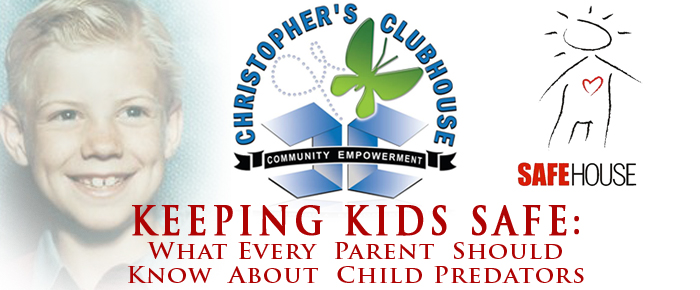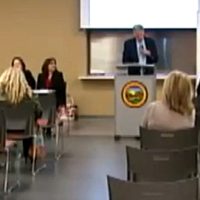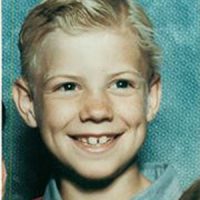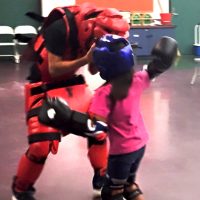
By Heidi Simmons
One in three girls and one in four boys will be sexually assaulted before the age of 18. In the United States, 800,000 children go missing every year. The majority are run-a-ways and second largest group are throw-a-ways –- kids who are kicked out of their homes, usually by parents.
58,000 children are never found. 115 to 150 are “stereotypical abduction” – grabbed by someone they don’t know. These children are taken over 20 miles from their homes, molested and killed within the first three hours of their abduction.
These terrifying statistics and ways to protect children were shared with parents and families at the “Keeping Kids Safe: What Every Parent Should Know About Child Predators,” presented by SafeHouse of the Desert and Christopher’s Clubhouse. This informative and focused event was held at the Desert Hot Springs Wellness Center.
Organizers offered advice and presented available services to address community concerns after the arrest of a Desert Hot Springs man accused of luring local children into a pornography ring.
“We want to do everything we can to protect, strengthen and help our communities,” said Kathy McAdara, Executive Director, Operation SafeHouse.
Former Palm Springs Police Chief and Palm Springs school board member, Gary Jeandron moderated a panel of five experts. Jeandron is a Marriage and Family Therapist and is on the board of SafeHouse.
“This evening is about how to keep kids safe, what to do if you need services and how to report an incident,” said Jeandron. “We will not be taking questions regarding the recent arrest. There is an on-going investigation and we want to be sure that justice is served.”
Mika Moulton is Founding Director of Christopher’s Clubhouse. Her non-profit organization provides safety camps where children, teens and adults are instructed on how to be safe and avoid exploitation.
Moulton’s son Christopher was abducted when he was eight, molested and murdered. “I thought it was something that happened to other people,” said Moulton. “I taught my children not to talk to strangers. Yet I became one of those other people. It’s important to do whatever it takes to teach our children to be safe.”
McAdara warned parents about the Internet. “Many chat-sites for kids are fronts for predators,” McAdara said. “Just because a site asks for parent’s permission doesn’t mean kids are safe.” McAdara suggested parents monitor Internet activity and place restrictions on their children’s phones. The panel warned that once a picture is on the Internet, there is no deleting it! NOT EVER!
McAdara also warned parents about advertisers who seek teens to work on weekends offering hundreds of dollars and transportation. “Don’t do it!” she said. “Parents must take control of their children the best that they can.”
Randy Boyd, Founder of Courageous Healers Foundation shared his personal story of abuse by his stepfather. “According to the 2010 census, 74,000 men and boys have been sexually abused. The sexual molestation in the Coachella Valley is reaching epidemic proportions,” Boyd said. “The most important thing you can do is to believe your children.”
Francisca La Franco of SafeHouse, shared the signs and symptoms of an abused child. They include: Sudden changes in behavior, learning problems, poor concentration, poor or excessive hygiene, change in wardrobe, angry or fearful, aloof, self-destructive. “If your child is exhibiting behavior that isn’t normal, stop what you are doing and listen to your child,” said La Franco.
Sofia Campos, Director of Program Services, United Cerebral Palsy of the Inland Empire, spoke about the safety of kids with special needs. “Special needs children are so loving and trusting, they are easy targets for predators,” Campos said. “They are three times more likely to be abused and four times more likely to be abused if the child has a mental disability.”
Predators look for kids who are vulnerable and alone. The panel recommended the community get involved to teach children ways to protect themselves. They encouraged parents to be present in the lives of their kids and to really hear them when they talk.
If you suspect a child is being abused, the panel recommends calling 911 or Child Protective Services and let the professionals handle the situation. The panel agreed that it is better to err on the side of making a mistake. Jeandron said, “We’ve seen cases where if someone would have called, we could have prevented victims down the line.”
For more information on local education programs call 760 989 2182 or visit www.christophersclubhouse.org To talk to a crisis counselor call the Child Help National Child Abuse Hotline at 800 422 4453. To further understand the signs and symptoms of child abuse go to www.childwelfare.gov














































